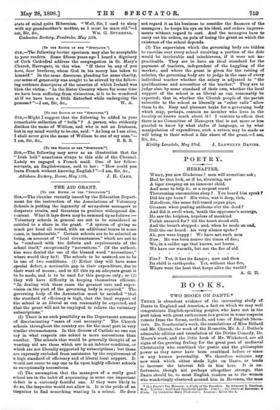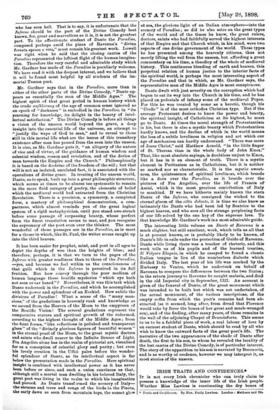BOOKS.
TWO BOOKS ON DANTE.*
THERE is abundant evidence of the increasing study of Dante in England and America, a fact on which we may well congratulate English-speaking peoples, who have not in the past taken with great enthusiasm to a genius in some respects remote from the forms, methods, and tone of English litera- ture. Dr. Scartazzini's work, the translations of Miss Hillard and Mr. Church, the work of the Rossettis, Mr. A. J. Butler's admirable edition and translation of the Divine Comedy, Dr. Moore's work, and the little book of Mr. Wicksteed, are all signs of the growing feeling for the great poet of mediseval Christianity who combined the poetic and the philosophic power as they never have been combined before or since in any human personality. We therefore welcome any new work which either sheds light on Dante, or tends to increase the interest felt in him here. It is un- fortunate, though not perhaps altogether strange, that Dante should be, to most English readers as to the women who wonderingly clustered mound him in Ravenna, the man
• (1.) Dante's Ten Heavens: a Steely ef the ParadAso. By Edmond G Gardner, W.A. Loudon: Arehtbald Oonetable ssid ()o. [12s.)—(2.) Dante at I:Lammas; Study. Sy Catheriue Mary Phdl:moro. Loncou Elliot btu k.
who has seen hell. That is to say, it is unfortunate that the Inferno should be the part of the Divine Comedy best known, for, great and marvellous as it is, it is not the greatest part. To the affectionate student of Dante the Paradiso, composed perhaps amid the pines of Ravenna's "divina foresta spessa e viva," mast remain his greatest work. Lowell was right when he said that the closing cantos of the Paradiso represented the loftiest flight of the human imagina- tion. Therefore the very careful and admirable study which Mr. Gardner has made of the Paradiso is peculiarly welcome. We have read it with the deepest interest, and we believe that it will be found most helpful by all students of the im- mortal Tuscan poet.
Mr. Gardner says that in the Paradiso, more than in either of the other parts of the Divine Comedy, "Dante ap- pears as essentially the man of the Middle Ages." The highest spirit of that great period in human history which the crude aufidarung of the age of common sense ignored as an epoch of " darkness " is embodied in the Paradiso, in "its yearning for knowledge, its delight in the beauty of intel- lectual satisfaction." The Divine Comedy is before all things a vision of the unseen world beyond the grave, a deep insight into the essential life of the universe, an attempt to "justify the ways of God to man," and to reveal to those still in this mortal life what are the issues of this transitory existence after man has passed from the seen into the unseen. It is also, as Mr. Gardner puts it, "an allegory of the nature of vice and of virtue, of the guidance of human wisdom and celestial wisdom, reason and revelation, and of the duties of man towards the Empire and the Church." Philosophically it is based on the doctrine of the freedom of the will ; but that will is not an isolated, unrelated fact, it is associated with the operations of divine grace. In treating of the unseen world, Dante, so to speak, built up into a great philosophic structure, which seems at times to be almost too systematic to remain in the more fluid category of poetry, the elements of belief which the medimval world had extracted from the Christian Revelation. There is a precision, a symmetry, a completed form, a mastery of philosophical demonstration, a com- pactness, which almost reminds you of the great logical system of a rigid metaphysician, until you stand awe-struck before some passage of surpassing beauty, whose perfect form the finest translation seems to mar, and you recognise the supremacy of the poet even over the thinker. The most wonderful of these passages are in the Paradiso, as is meet for a theme in which, like St. Paul, the writer seems caught up into the third heaven.
It has been easier for prophet, saint, and poet in all ages to depict the depths of woe than the heights of bliss ; and therefore, perhaps, it is that we turn to the pages of the Inferno with greater readiness than to those of the Paradise', —yes, and because we feel within us the consciousness of that guilt which in the Inferno is perceived in its full fruition. But how convey through the poor medium of human language those beatific mysteries "which eye bath not seen or ear heard"? Nevertheless, it was this task which Dante undertook in the Paradiso, and which he accomplished with the power and splendour of an Ezekiel. How subtle the divisions of Paradise! What a sense of the "many man- sions," of the gradations in heavenly rank and knowledge as we ascend from the Heaven of the Moon to the empyrean of the Beatific Vision! The several gradations represent the comparative stature and spiritual growth of the redeemed, according to the highest thought of the Middle Ages ; from the faint forms, "like reflections in polished and transparent glass" of the "divinely glorious figures of beautiful women" in the eternal pearl of the Moon, to the great mystic doctors and saints who dwell nearer to the Infinite Source of Light. Fra Angelico alone has in the realm of pictorial art, visualised for us a conception of celestial glory and purity ; but even Ina lovely creation in the Uffizi pales before the wonder- ful splendour of Dante, as its intellectual aspect is far below the presentation made in the Paradiso. Here spiritual insight is combined with intellectual power as it has never been before or since, and such a union convinces us that, although still a mortal man dwelling in his beloved Italy, the great poet was living in the realm to which his imagination had pierced. As Dante transfprmed the scenery of Italy— the streams and trees and songs of the birds in the Pineta, the early dawn as seen from mountain tops, the sunset glow
at sea, the glorious light of an Italian atmosphere—into the scenery of Paradise ; so did he also seize on the great types of the world and of the times he knew, the great rulers, doctors, saints who had faithfully served the highest interests of that Empire and that Church which, in his mind, were two aspects of one divine government of the world. These types he has presented among the heavenly citizens, thus not merely lifting the veil from the unseen, but affording a great commentary on his time, a theodicy of the whole of medimval history. This continuous blending of earth and heaven, this perpetual relation of human justice to the interior facts of the spiritual world, is perhaps the most interesting aspect of the Paradiso and that in which, as Mr. Gardner says, the representative man of the Middle Ages is most conspicuous.
Dante dwelt with just severity on the corruption which had begun to eat its way into the Church in his time, and he has placed on pedestals of infamy some of the medimval Popes. For this he was treated by some as a heretic, though his " Credo " is of the most orthodox Christian type. But if the average Protestant desires to know the power and beauty, the spiritual insight, of Catholicism at its highest, he must go to Dante. At times the moral strength of Protestantism is his, but there is also a mystic beauty which Protestantism hardly knows, and the decline of which in the world means the loss of a subtle loveliness in religion and art which our age of mechanism can hardly understand. "There was more of Jesus Christ," said Matthew Arnold, "in the little finger of St. Theresa than in the whole body of John Knox."
That, like most absolute sayings, is doubtless unjust to Knon, but it has in it an element of truth. There is a mystie element in Puritanism as in Catholicism, but it is neither so marked nor so characteristic. It is the mystic sweet- ness, the quintessence of spiritual loveliness, which broods like a dove over the Paradiso, as it broods over the pictures of Fra Angelico, over the life of Francis of Assisi, which is the most precious contribution of Italy to mankind. If we have hitherto mainly known the stern Dante of the Inferno, who consigned the wicked to the eternal gloom of the cilia dolente, it is time we also knew as intimately the Dante who had been led by Beatrice to the highest heaven, and who sees all the strange perplexing facts of our life solved by the one key of the supreme love. To that knowledge Mr. Gardner's work is a most admirable guide.
The interesting little volume on Dante at Ravenna is a much slighter, but still excellent, work, which tells us all that is at present known, or is probably likely to be known, of Da.nte's life in exile under the protection of Guido of Ravenna. Dante while living there was a teacher of rhetoric, and this work tells us of his pupils and of the learned treatise, Ii Volgare Eloqvio, in which he essayed to found a classie Italian tongue in lien of the numberless dialects which divided Italy. The last year of his life was marked by the Embassy to Venice, which he undertook on behalf of Ravenna to compose the differences between the two States; in the return journey to Ravenna he caught malaria, and died in the old Imperial city in September, 1321. An account is given of the funeral of Dante, of the great monument which, was intended to be built but which was not undertaken, of the actual monument, of the various inscriptions, of the empty coffin from which the poet's remains had been ab- stracted (as it seemed, long after, from dread that Florence would take by force the hones of her great and much-wronged son), and of the finding, after many years, of those remains in the wall of the adjoining Chapel of Braccioforte. This seems to us to be a faithful piece of work, a real labour of love by an earnest student of Dante, which should be read by all who wish to know the outward facts of the great poet's life. The narrative of the two appearances of the shade of Dante after death, the first to his son, to whom he revealed the locality of the lost cantos of the Divine Comedy, is of particular interest. The story of the apparition to his son is narrated by Boccaccio, and is as worthy of credence, however we may interpret it, as most stories of the unseen.



































 Previous page
Previous page